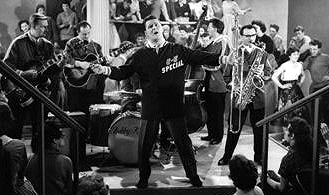|
This
page optimised for
1440 x 900 resolution
Related Sixties
City Pages
TV Pop and Music
Shows
Juke Box Jury
Thank Your Lucky Stars
Top
of the Pops
Ready Steady Go!
Eurovision
Song Contest
Royal
Command Shows
External Site Links
Whirligig
- 6.5 Special
|
 |
Jo
Douglas then said, “Well, I’m just a square it seems, but for
all the other squares with us, roughly translated what Pete Murray
said was: ‘We’ve got some lively musicians and personalities mingling
with us here, so just relax and catch the mood with us.” Kenny
Ball & his Jazzmen opened and closed the show, which also featured
Michael Holliday, The King Brothers and Bobbie and Rudy. The show
was only originally scheduled to last for six weeks, but lasted
for 96 fifty five minute programmes.
The other co-producer of the initial shows was Jack Good. Later
producers were Dennis Main Wilson and Russell Turner. Other presenters
were Jim Dale and Freddie Mills. Its mix of rock'n'roll, jazz,
sports and general interest items proved such a success that the
run of the show was extended. The resident band was Don Lang and
His Frantic Five, who used the catch phrase “Time to jive on the
old six five.” His band recorded the show’s theme tune, which
began “The 6.5 Special’s steamin’ down the line, the 6.5 Special’s
right on time…” They also backed a number of the show’s guest
stars. |
A
lot of the credit for the immediate success of the programme was
due to Jack Good, who had his pulse on the mood of teenage Britain.
Unfortunately, BBC management kept interfering with the show,
introducing educational elements into it and boxer Freddie Mills
was brought in to include a sports section. Good and the BBC didn’t
see eye to eye and they fired him, leading to a huge drop in audience
figures. Here is an example of the show as screened on 31st August
1957, which begins with Pete Murray introducing Eric Delaney and
his Band who play ‘Ole’ King Rock ‘n’ Roll’ before a jiving audience.
Murray next introduces comedian Spike Milligan, playing an inventor
called Mr Pym who has created a device that indicates when jelly
is present in the room. Liverpool singer Michael Holliday then
mimes to ‘Old Cape Cod’, followed by ‘Love You Darlin’’, backed
by Don Lang and his Frantic Five. Holliday next introduces the
trio of Jo Douglas, Freddie Mills (dressed as a Teddy Boy) and
Pete Murray, who sing a comic version of the show’s theme tune.
|
|
 |
Lang
then performs his latest record ‘White Silver Sands’ and introduces
Bill Ross and Lesley who demonstrate a rock‘n’roll dance to the
tune of ‘Rex’s Rock.’ American
band leader Ray Anthony is introduced by Murray and Anthony claims
that there is nothing like the show on American television. During
the conversation Anthony mentions that he has made a record called
‘Bunny Hop’, and Bill Ross and Lesley, together with the studio
audience, dance to it.
There follows a location clip of Douglas and a group of climbers
at the Milestone Buttress in North Wales. Back in the studio,
Douglas then introduces Chris Barber and his Band with Ottilie
Patterson, who sings ‘Steamboat Bill’, following which the band
play an instrumental number. Murray next introduces the Deep River
Boys who sing ‘All Shook Up’, ‘Love Me Tender’, ‘When Rock‘n’Roll
Came To Trinidad’ and ‘Not Too Old To Rock‘n’Roll.’ The show ends
with Eric Delaney and his Band performing ‘The Banana Boat Song.’ |
|



